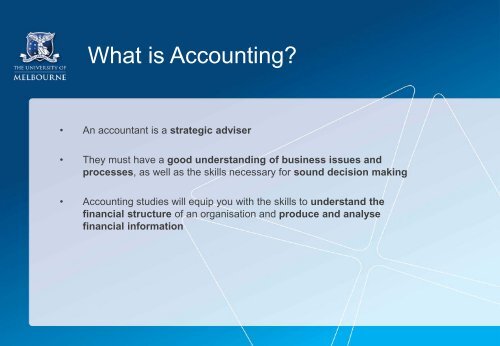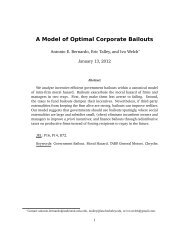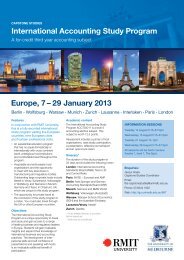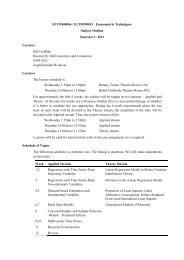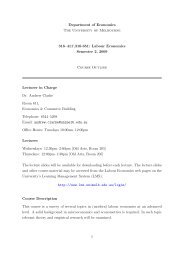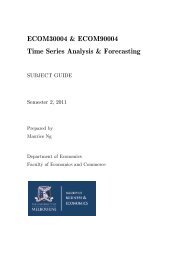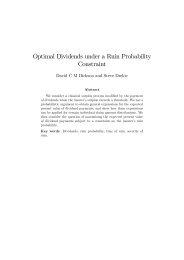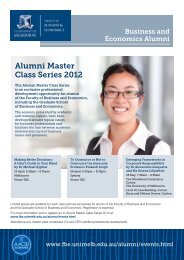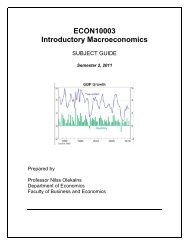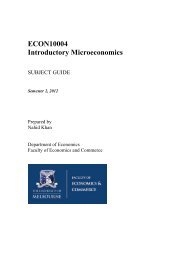Accounting (pdf)
Accounting (pdf)
Accounting (pdf)
You also want an ePaper? Increase the reach of your titles
YUMPU automatically turns print PDFs into web optimized ePapers that Google loves.
What is <strong>Accounting</strong>?<br />
• An accountant is a strategic adviser<br />
• They must have a good understanding of business issues and<br />
processes, as well as the skills necessary for sound decision making<br />
• <strong>Accounting</strong> studies will equip you with the skills to understand the<br />
financial structure of an organisation and produce and analyse<br />
financial information
Different areas of <strong>Accounting</strong><br />
Financial <strong>Accounting</strong> encompasses the external<br />
reporting of a company’s financial position and<br />
performance. Financial accounting information is<br />
used in making investment decisions and is widely<br />
used to value businesses and predict corporate<br />
success and failure.<br />
“.. when . Rupert Murdoch presented News<br />
Corporation's full-year results yesterday, the<br />
simple bottom line showed a swing back to a<br />
$US2.5 billion ($A2.7 billion) profit after last<br />
year's $US3.4 billion loss, buoyed by the<br />
extraordinary success of the film Avatar and<br />
the absence of hefty write-downs that marred<br />
last year’s result.”<br />
The Age, Fri 6 August 2010
Different areas of <strong>Accounting</strong><br />
Management <strong>Accounting</strong> provides information to managers to help them measure and<br />
control processes within their business in a successful and profitable manner. It aids<br />
managers in strategy implementation, costing of new products and services, evaluation of<br />
the value added by different areas of the business and managing their performance.<br />
“..up to 30 redundancies at [BRL Hardy’s]<br />
Tintara winery in SA as it responds to<br />
the drawn-out malaise of the<br />
international wine industry. The job<br />
losses will mark the second round of<br />
redundancies for the winemaker this<br />
year. It laid off 40 staff at its South<br />
Australian bottling headquarters in<br />
March after deciding to shift more of its<br />
production to Britain to cope with the<br />
downturn.”<br />
The Age, Fri 6 August 2010
Different areas of <strong>Accounting</strong><br />
Auditing and Assurance Services is about monitoring and adding credibility to the<br />
external reporting disclosures made by companies. In addition, assurance services add<br />
credibility to non-financial information e.g. Brownlow voting, the Oscar count,<br />
environmental reporting, customer-satisfaction surveys and internet reporting.
What do practicing accountants do?<br />
• Assemble financial information about a business/non-profit or<br />
government entity<br />
• Audit financial statements prepared by others to make sure they give<br />
external stakeholders a true and fair view<br />
• Analyse financial information about alternative business strategies, to<br />
assist management<br />
• Advise business managers on financial matters (including tax and<br />
management consulting)<br />
• Advise on business mergers and acquisitions<br />
• Rescue or dissolve firms that get into financial trouble<br />
• Investigate white collar crime (forensic accounting)
How to become an accountant<br />
Undergraduate degree in Commerce with <strong>Accounting</strong> specialisation<br />
Honours in <strong>Accounting</strong><br />
Work in <strong>Accounting</strong> Profession<br />
Large or small firms of accountants doing<br />
audit, tax, insolvency and consulting to<br />
corporate and public sector clients<br />
OR<br />
Work in industry as an Accountant<br />
Employed in accounting function with large<br />
or small companies, government or nonprofit<br />
entities<br />
Postgraduate study<br />
through ICAA or<br />
CPA (Aust)
First year in <strong>Accounting</strong><br />
The <strong>Accounting</strong> specialisation / first year:<br />
ACCT10001<br />
<strong>Accounting</strong> Reports and Analysis<br />
ACCT10002<br />
Introductory Financial <strong>Accounting</strong><br />
ACCT10003<br />
<strong>Accounting</strong> Processes and Analysis<br />
Prerequisites for second year<br />
<strong>Accounting</strong><br />
Students pursuing accounting accreditation must complete the<br />
following subject also:<br />
Principles of Business Law
Second year in <strong>Accounting</strong><br />
The <strong>Accounting</strong> specialisation / second year:<br />
ACCT20001<br />
Cost Management<br />
Prerequisites for third year<br />
<strong>Accounting</strong><br />
ACCT20002<br />
Intermediate Financial <strong>Accounting</strong><br />
Students pursuing accounting accreditation must complete the<br />
following subjects also:<br />
Corporate Law<br />
Business Finance
Third year in <strong>Accounting</strong><br />
The <strong>Accounting</strong> specialisation / third year:<br />
ACCT30001<br />
Financial <strong>Accounting</strong> Theory<br />
ACCT30002<br />
Enterprise Performance Management<br />
ACCT30004<br />
Auditing + Assurance Services<br />
Students pursuing accounting accreditation must complete the<br />
following subject as part of their breadth component:<br />
Taxation Law I
Electives in <strong>Accounting</strong><br />
<strong>Accounting</strong> electives:<br />
ACCT20006<br />
Business Forensics + Fraud<br />
ACCT30006<br />
Business + Financial Analysis


